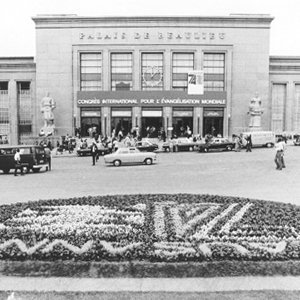Someone has said that if you do not know who you are, you will not know where you come from and certainly will not know where you are going! So I would like to suggest seven words or phrases which describe the nature or identity of Lausanne:
- Lausanne is a movement and not an organisation. There is no membership or annual subscription. People are bound together by a common vision to take the gospel to the ends of the earth.
- It is an evangelical movement. Historically, the word was first used around 180 AD in debates with heretics to describe those Christians whose aspiration was to be thoroughly biblical and to live under the authority of Scripture. This is important, as many people tend to think that the term evangelical was first used in the Reformation. However, it predates the Emperor Constantine and the birth of the Roman Catholic Church.
- Worldwide evangelism. It is a movement which encourages worldwide evangelism, with its message about the need to be ‘born again’ or ‘born anew’. At the same time, from its inception, the Lausanne Movement has emphasized the importance of the church being engaged in ministries of evangelism and social action like the two edges of a scissors.
- Partnership and cooperation. It is a movement which seeks to emphasise partnership and cooperation. Early leaders emphasised that Lausanne fruit grows best on other people’s trees, so that our aspiration is not, and should not be, to control everything, but to create opportunities for leaders when they meet together to partner in the cause of the gospel. It is interesting to note that over 300 partnerships issued, for example, out of the Manila conference in 1989. It was at that conference that the many Bible-orientated agencies around the world decided to meet together, rationalise their work, avoid competition, and work in greater partnership. This has subsequently led to more effective Bible translation ministry around the world, less wastage of the financial resources God has given into our hands, and more productive and effective ministry.
- It is a catalytic movement, aiming to create space for leaders when they gather together to dream new dreams and fresh vision, and to focus on addressing cutting-edge missiological issues—hence Lausanne’s mission statement, ‘connecting influencers and ideas for global mission’.
- Cultural sensitivity/contextualisation. As a movement, Lausanne seeks to encourage cultural sensitivity or contextualisation in addressing gospel-related issues. We seek to make a distinction between biblical principles which are eternal and unchanging, and missiological methods which may vary according to the cultural context.
- The seventh word is networking. Lausanne seeks to create opportunities for networking, bringing leaders together to engage with key ideas related to worldwide expansion of the gospel. As leaders meet together, they often spark a new vision for the advance of the gospel.
Salt and light
So as we look to the future, what should govern our aspirations? Perhaps Jesus’ models of salt and light in Matthew 5:13-16 could give us a framework.
What values and standards will dominate our national culture? This is both an evangelistic and social question. I would suggest there are four things to think about in Jesus’ exhortation:
- Christians are called to be radically different from non-Christians. The two communities are contrasted with each other (the world/you; darkness/light; decay/salt). This call to be different is a major theme of the whole Bible.
- Christ calls us to penetrate non-Christian society. As John Stott said: ‘Although spiritually and morally distinct, we are not to be socially segregated.’[1] The light must shine in the darkness and salt must soak into the meat.
- Christians can influence and change non-Christian society. Salt and light are effective commodities—they change their environment. So if society goes bad, we must accept a large proportion of the blame. Kenneth Scott Latourette highlighted six weapons of the Christian armoury as being prayer, evangelism, example, argument, action, and suffering. We are to use all the weapons which God gives us.
- Finally, Christians are called to retain their Christian distinctiveness. The salt must retain its saltiness and the light its brightness; so Christians must penetrate but not assimilate the world.
Cape Town 2010—What was the fruit?
It often takes 10-20 years to discern the fruit of such an event. For example, it was only some years after the 1989 Congress that we were able to see how many partnerships had issued out of it. However, we can already see some initial fruit from the 2010 Congress, the most important of which is The Cape Town Commitment. It is noteworthy that the second half is a summary of perspectives and recommendations that we received from the 198 countries represented at the Congress when they were asked about the major missiological challenges facing the church in 2010.[2]
In my view, The Cape Town Commitment is a remarkable document for several reasons. I believe that it will be viewed as one of the great documents in the history of the evangelical church because it brings together two things: a series of statements about what evangelicals have believed for 2,000 years and a call to action. It seeks to bring together doctrine and praxis.
It is also the first document introduced by the church in history which is written in the language of love—‘framed in the language of love’, as the Preamble states.[3] It is thoroughly biblical, with text incorporated from over 40 books in the Scriptures. It is wonderfully balanced in its treatment of the call to evangelism, alongside ministries of compassion, its statements on truth as well as on other faiths, and its call to proclamation as well as lifestyle evangelism. It is panoramic in its perspective and biblically comprehensive in its reach. It merits widespread discussion, reflection, dialogue, and action.[4]
In addition, the Cape Town Congress was applauded by its participants for its innovative use of small groups and for the emphasis on Mission Africa, whereby mission events, including evangelism and ministries of compassion, preceded and post-dated the Congress in at least 15 African countries. This work has continued in other African countries and has spawned other evangelistic efforts in other countries in subsequent years around the world.[5]
It was a gathering which brought together large numbers of young leaders (1,000 of those present were under 40 years of age); it highlighted the use of technology and the arts, which has not always been a strong point of evangelicals; it was a time of great testimonies; and it demonstrated an attempt to work in partnership with the WEA.
But what of the future?
In June 2011, more than 150 leaders met in Boston to reflect on the Cape Town Congress and on the future.
A six-fold vision issued out of that conference as we processed feedback from the 2010 Congress. These distinctives highlight the ways in which Lausanne will seek to work in the coming years:
- Human resources. We will provide human resources as servants to the global church, in seeking to encourage the application of The Cape Town Commitment. This will be done through Lausanne’s teams of 12 Regional Directors, and over 60 Catalysts (issue specialists formerly called Senior Associates), who have experience in each of the key areas highlighted in the Commitment as being of missiological importance in the contemporary world. These people around the world will seek to connect influencers and ideas for global mission in the future.
- Lausanne Global Analysis. We determined to form a Lausanne Global Analysis, through which we would provide regular analysis of global trends and their implications, and reflection on the state of the church and its witness globally—you can learn more at https://lausanne.org/lga.
- Younger leaders. We will continue to focus on the identification and equipping of younger leaders with the provision of an international congress in Indonesia 2016 and a follow-through of that programme.
- We will seek to hold occasional regional and national gatherings in the coming years, reflecting on progress relating to the Commitment and providing an update on the state of the church globally. Regional gatherings will especially focus on the applications of key themes of the Commitment in each part of the world.
- We will seek to hold a number of smaller international consultations on key issues emerging out of Cape Town. Several such consultations have already been held in the past five years—prosperity theology and the gospel; creation care and the gospel; the challenge of Islam; and the use of media in worldwide evangelism.
Further consultations on cutting-edge issues need to occur on some of the major issues arising out of Cape Town, including the challenge of migration/diaspora; megacities; ethnicity and identity; the continuing challenge not only of Islam but also of Buddhism; the need to reach oral learners as well as unreached people groups; the urgency of Christian witness in public life; sexuality and the gospel; and the implications and challenges posed by secularism. - Issuing out of these consultations, it is our hope to produce literature of enduring worth, covering contemporary missiological issues, similar to the Occasional Papers produced by Lausanne after the 1974 Congress.
Principles for future ministry
As I step down as Global Associate Director for Regions[6] of Lausanne, it is my hope that Lausanne will be guided by several principles as we engage in these areas of ministry:
- Avoiding duplication of efforts by others.
- Where possible, seeking to partner with others.
- Focusing on cutting-edge issues and providing a platform for evangelicals while endorsing good work in others.
- Functioning as an ‘honest broker’—providing space for evangelicals to reflect and serve the global church by providing creative and critical perspectives on the challenges facing us, in the belief that Lausanne grows best producing fruit on other people’s trees.
- Listening to and reflecting conviction and concerns expressed by evangelical leaders across the globe, avoiding domination of any one perspective.
- Living under the authority of Scripture ‘as we seek to call the global church to bear witness to Jesus Christ and all his teaching in every area of the world geographically, and in every sphere of society, including the realm of ideas’ (Commitment).[7]
- Working for depth through networking, rather than through isolation.
I am delighted to commend to you for your prayers and support Lausanne Global Executive Director/CEO, Dr Michael Oh, and his team, including my successor, Dr Las Newman from Jamaica, former Deputy General Secretary of IFES and Principal of the Caribbean Graduate School of Theology. As we seek to be faithful to God’s calling to take the gospel to the ends of the earth, we would appreciate your prayers and engagement with us.
Endnotes
- John Stott, Through the Bible, Through the Year: Daily Reflections from Genesis to Revelation (UK: Lion Hudson, 2006), 193.
- Editor’s Note: See article entitled ‘A Personal Reflection on Cape Town 2010’ by Doug Birdsall in the November 2015 issue of Lausanne Global Analysis.
- https://lausanne.org/content/ctc/ctcommitment
- Editor’s Note: See for example The Cape Town Commitment Study Edition by Rose Dowsett; Bibliographical Resources for The Cape Town Commitment edited by Darrell Bock; and other resources in the Lausanne Library Bookstore.
- Editor’s Note: See article entitled ‘Engaging the Church in Africa in its Key Mission Issues to 2050’ by Rudolf Kabutz in the November 2015 issue of Lausanne Global Analysis.
- Editor’s Note: The role of Global Associate Director for Regions was formerly called ‘International Director’ prior to 2016.
- https://lausanne.org/content/ctc/ctcommitment

